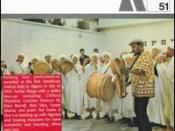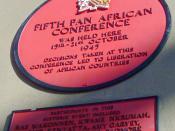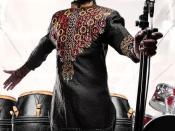From as early as the 1800s Pan-Africanism is a term that has been used to represent an ideology, which states that African rooted people from all over the world share not merely a common history but a common destiny. The idea that Africans should all be united has sparked off many movements especially in Political institutions. Pan-Africanism played a key role in influencing both African Nationalism as well as the Gold Coasts road to independence.
Pan-Africanism was created by groups of ex-slaves from Africa. These groups were situated in the Caribbean as well as North America. These ex-slaves suffered many forms of abuse - racism and discrimination - being the two major problems. The first Pan-African conference was the Chicago Conference, held on the 14 August 1893. This conference made the world more aware of the idea and gathered many new partners. In 1912 Marcus Garvey, from Jamaica, began to envision a global movement that would unite the African race and create an African empire.
In 1914 Garvey established the Universal Negro Improvement Conservation Association. (UNIA). The UNIA suddenly grew into one of the biggest organizations in the history of Pan-African movements. Garvey's slogan was Africa for the Africans - which gained mass support. By 1920 Pan-Africanism was world-renowned and had gained millions of supporters. WEB du Bois, an intellectual from the USA, was the most influential of the supporters.
Du Bois had been a representative of the American Negro Academy and participated in the 1900 Pan-African conference. He called for a second Pan-African Congress, which resulted in a new set of rules being implemented. These rules promoted the return of expropriated lands, development of the African people as well as a call to all black Africans across the world. A second Pan-African Association (PAA) was established which Du Bois...


